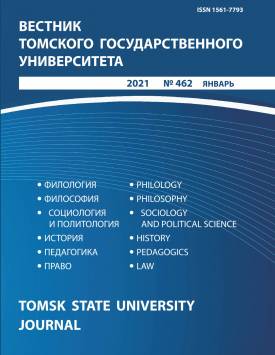Foreign Language Classes in a Pedagogical University: Topical Problems and Possible Solutions
The article discusses a new strategy of professionally-directed (didactic-oriented) foreign language teaching to students of a language pedagogical university (future teachers of a foreign language). The study analyses the components of the teacher's methodological (linguodidactic) competence, revealing a number of problems concerning their formation in a pedagogical university, as well as showing the dependence of their development on the intensity of their actualisation in the Foreign Language Practice discipline. The article identifies several factors hindering the formation of the linguodidactic competence within foreign language classes. In order to overcome these negative factors, the article offers a new model of teaching foreign languages, described in the formula “from the acquisition of didactic experience to one's own educative decisions”. The methodology of this model is based on two interrelated methods: contextual teaching and vocation-focused foreign languages teaching, as well as related methods for organizing productive teaching of a foreign language. The model mentioned above assumes a two-stage implementation. At the first stage, analytical work of students is organized. Its aim is to understand and analyse the teaching practice. An important condition is the modelling of basic structural elements and some procedural features of a school lesson while organising university foreign language classes. Particular attention is paid to the implementation of individualised goal-setting, planning and self-assessment (reflection), demonstration of lexis, grammar and phonetics mastering, of active forms and techniques for organising communicative activities, methodological reflection. At the first stage, university students are also offered some methodological tools (for example, goalsetting maps and maps for academic work planning, etc.), which can be used in teaching foreign languages at school. When organising the educational process, much attention is paid to the awareness of methodological facts, phenomena, patterns. Therefore, a new type of exercises (educational-methodological) has been proposed. In addition to an educational task, these exercises contain a methodological task in form of a short comment, an additional question, etc. At the second stage, there is a transition to the organising of a productive methodologically oriented foreign language activity. Three main methods of methodologically oriented teaching are distinguished: modification of authentic (university) materials for different age groups of schoolchildren, conventional “professional test”, and project educational-methodological activity. In conclusion, the main results of the study are summarised.
Keywords
teacher's training, foreign language classes, didactic experience acquisition, educational-communicative activities of studentsAuthors
| Name | Organization | |
| Kolesnikov Andrei A. | Ryazan State University named for S.A. Yesenin; Moscow City University | kolesnikow@list.ru |
References

Foreign Language Classes in a Pedagogical University: Topical Problems and Possible Solutions | Vestnik Tomskogo gosudarstvennogo universiteta – Tomsk State University Journal. 2021. № 462. DOI: 10.17223/15617793/462/24
